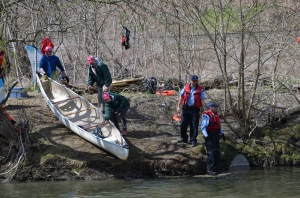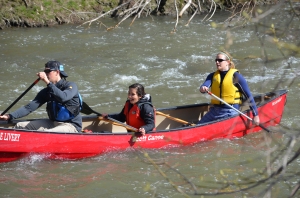 After a 15-year hiatus, the spring bear hunt is back for a two-year trial, subject to the approval of select municipalities in northern Ontario. Only residents of the province need apply, leaving out the Europeans, Americans and Russians who used to pack out the hunting lodges: so no bump in tourism dollars. (First Nations and Métis have always hunted year round.)
After a 15-year hiatus, the spring bear hunt is back for a two-year trial, subject to the approval of select municipalities in northern Ontario. Only residents of the province need apply, leaving out the Europeans, Americans and Russians who used to pack out the hunting lodges: so no bump in tourism dollars. (First Nations and Métis have always hunted year round.)
Public safety issues associated with nuisance bears were cited as the reason for reversing the ban. The Animal Alliance of Canada and Zoocheck Canada challenged that argument in court, arguing that the hunt would do nothing to solve the problem and would result in killing mothers and orphaning cubs but the court found against the groups.
“Politics” comes in for a lot of blame here. Some southern, nuisance-bear-suffering municipalities attribute their ineligibility to the province’s wanting the reinstatement to escape the attention of the “animal-rights-types”, presumably residents of the south. The proprietors of the just-scraping-by hunting lodges would have liked to see hunters from outside the province participate. And of course, the people who fought the long hard battle to institute the ban suspect the spring hunt is a vote-getting tactic in ridings where the Liberal government is weak.
 How bad is it? Carole White of McGregor Bay writes, “In the first break-in, the bear used its paws to rip open the dryer vent while we were in residence. Another time, again while we were there, the bear pried open a window and ran off with a large plastic bin of dog food without spilling a kernel. Two additional break-ins occurred when the cottage was unoccupied. A large plate glass picture window was pushed in until it broke. The fridge was raided and food spilled about: cooking oil, flour and sugar all over the floor. The only thing untouched was a box of coffee filters.”
How bad is it? Carole White of McGregor Bay writes, “In the first break-in, the bear used its paws to rip open the dryer vent while we were in residence. Another time, again while we were there, the bear pried open a window and ran off with a large plastic bin of dog food without spilling a kernel. Two additional break-ins occurred when the cottage was unoccupied. A large plate glass picture window was pushed in until it broke. The fridge was raided and food spilled about: cooking oil, flour and sugar all over the floor. The only thing untouched was a box of coffee filters.”
A few years back, the Ontario Ministry of Natural Resources was painstakingly trapping bears, hauling them into trucks, driving 100 kilometres north, releasing them and then finding them back home again a week later.
MNR has been running a very popular Bear Wise Program. “Problems with bears are usually created by people. By following these tips every spring, summer and fall, you can avoid attracting bears to your property,” it instructed. But now the program seems starved for funds and the MNR has simply stopped looking after bears.
“MNR has a mandate to manage all wildlife and it doesn’t have the right to pick and choose what animals it is going to manage,” fumed one municipal official who wanted to remain anonymous.
Since the cancellation of the bear hunt in 1999, the bear population has exploded say observers, but data is difficult to come by. Meanwhile, some municipal officials complain that residents are exhibiting garbage-sorting and handling fatigue. Bags of garbage are being dumped willy-nilly after hours at transfer stations, leading to increased clean-up costs and the threat that the Ministry of the Environment will close the affected sites.
As country living gets increasingly urbanized, residents age, and entitlements seem to become increasingly entrenched, it’s reasonable to suppose that people are finding certain aspects of rural living increasingly unacceptable, such as being crazy-vigilant about looking after garbage, cleaning their barbecues after each use, eschewing veggie gardens, composters and bird feeders: all bear deterrents. And then there are the outliers who deliberately feed bears.
 The Bear Wise Program is all about holding people responsible for keeping their food and garbage out of the reach of bears. But now attention has shifted to the bears themselves. They used to be a “nuisance”, now they’re described as a public safety problem.
The Bear Wise Program is all about holding people responsible for keeping their food and garbage out of the reach of bears. But now attention has shifted to the bears themselves. They used to be a “nuisance”, now they’re described as a public safety problem.
The public safety aspect is a bit of a stretch. Black bears very rarely attack people. You are probably much more likely to be attacked by a dog. But bear break-ins are terrifying. Residents can legally kill a bear that threatens their home or person at any time, nothing new about that. But actually shooting a bear that has just ripped the door off your fridge with bear cubs standing by is not something ordinary people can or will do, even assuming they have the appropriate weapon.
But does it follow that the spring bear hunt will deal effectively with the nuisance bear problem? Although the word isn’t used, the spring bear hunt is actually a passion-enflaming cull: reduce the bear population and you are bound to include some nuisance bears. But the logical extension of that theory is if the nuisance bear problem persists, the solution is more culls: if you want to be really safe from bears, you have to eliminate all of them.
This slippery slope could be avoided if we just accepted the fact that hunters want to hunt, and where the harvest is sustainable and regulations can be respected, perhaps a hunt should be considered on own merits instead of trying to make a case that hunting is going to deal effectively with nuisance animals. Because if after a cull, the same triggers exist to habituate bears to feasting on human garbage and food, then good bears are going to become bad bears.
A more honest discussion would also ponder the fact that spring is the preferred hunting season when the pelts are glossier and the meat leaner than in the fall. Pre-hibernation bear fat I’ve been told is horrible to eat. On the issue of cubs being orphaned in the spring —they’re born over the winter—hunters claim the absence of foliage in the spring allows them to determine whether a bear is a sow with cubs. Thus they can more accurately and legally kill only the males.
A Sans Souci hunter, just back from a 6-day moose hunt says his party found no moose at all but 29 bears. He speculates that the bears are emerging from their dens with no prospect of anything to eat except moose cubs and fawns, and that this is driving the moose and deer farther afield. He is definitely convinced that the bear population has exploded.
Intelligence gained in the bush year after year is invaluable, we should listen to it but as the biologists tell us, dramatic and devastating changes can happen to a species’ population over a very short time, and there is sometimes only the thinnest of lines between a small population and virtual extinction. But to have this sort of conversation, we would have to stop pussy-footing around the real agendas.
CBC News: Court Dismisses Animal Welfare Case Against Spring Bear Hunt http://www.cbc.ca/news/canada/thunder-bay/court-dismisses-animal-welfare-case-against-spring-bear-hunt-1.2626888
MNR Bear Wise Program http://www.mnr.gov.on.ca/en/Business/Bearwise/2ColumnSubPage/STEL02_167873.html
Ontario Press Release re Spring Bear Hunt http://news.ontario.ca/mnr/en/2013/11/ontario-proposing-a-black-bear-management-pilot-in-north.html
CBC News: Evidence to Support Spring Bear Hunt Lacking, Biologist Says http://www.cbc.ca/news/canada/sudbury/evidence-to-support-spring-bear-hunt-lacking-biologist-says-1.2628204
Animal Alliance of Canada http://www.animalalliance.ca/
